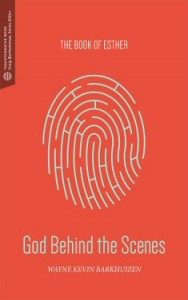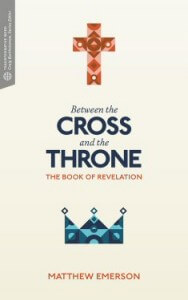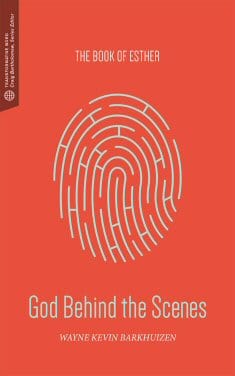The work of God’s Kingdom is never easy. For many ministries, crisis and chaos may seem like faithful companions. Facing the tension of this work is always challenging and it can be difficult to recognize God’s presence when the going gets tough. Stories of perseverance in the face of great adversity pepper the Bible and show us that God is with us in our endeavors, every step of the way. The two newest books in the Transformative Word series show us how God guides his people through trials and persecution, delivering them—and us—from destruction.
In God Behind the Scenes, Wayne Barkhuizen examines the strange yet gripping story of Esther, pointing out how it’s still relevant today. And in Between the Cross and the Throne, Matthew Emerson takes us through the book of Revelation, explaining the deep themes often missed within the book’s complex imagery. Both of these books are available now!
The Fingerprints of God

The story of Esther demonstrates that God will not be inactive in a world that is hostile to him and his people. He would rescue the Jews from genocide to ensure that a future Jewish descendant, a son of Abraham (Matt 1:17), would be born to deliver his people from death and destruction. The message of Esther is a special reminder to God’s ‘exiled’ people that he has not forgotten or abandoned them—and that he never will. So even though at times in the narrative God appears to have gone missing, he is actually profoundly present. He may be unseen, but he is unmistakably there.
Our position on this side of the cross likewise reminds us that we, as Christians, like these Jews in a foreign land, are not at home. We too still live as exiles (1 Pet 2:11), and we too can be sure of God’s presence both now and forever.
The Tension of Revelation

Today, many Christians avoid John’s vision of the end of all things, most likely because of his consistent use of unfamiliar imagery and figurative language. Most of us, especially modern Western Christians, are simply not familiar with this type of literature. Our unfamiliarity with the Old Testament—from which John draws most of his imagery—coupled with modernity’s focus on the objective and scientific, makes it difficult to grasp what John is doing in Revelation. For instance, Revelation 8–9 and its description of mutant locusts is difficult for modern readers to understand; in many cases, readers either avoid it and the book altogether or they try to make it match with today’s headlines—and in this case, with current military technology. Yet John explicitly uses distinct literary devices, a narrative, Old Testament allusions, and specific genres to help us grasp what he is doing in the book. Instead of being a book to avoid or a contemporary prediction chart, when we understand John’s methods, Revelation can be seen for what it is—a testimony to the Triune God’s work in Christ. Understanding how John uses each of the literary devices mentioned will allow us to further explore the theological message of individual passages and the entire book. In other words, we need to understand John’s work as literature in order to understand it narratively and theologically.
* * *
In the Transformative Word series, you’ll read the Bible with a global cast of church leaders and scholars. Edited by renowned scholar Craig G. Bartholomew, each contributor brings a unique personal and cultural perspective to reveal biblical truth in a way you may never have seen before. In conversational tone, each author explains the importance of a biblical book, showing how it can transform your life.
God Behind the Scenes and Between the Cross and the Throne are available now! Get both of these books today!





